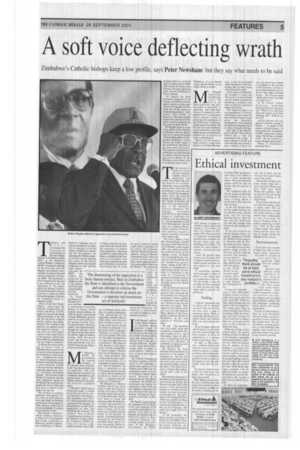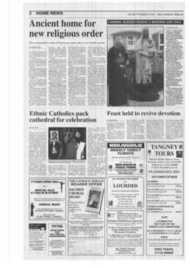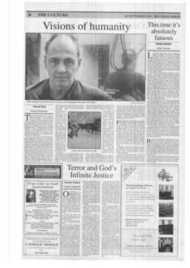Page 5, 28th September 2001
Page 5

Report an error
Noticed an error on this page?If you've noticed an error in this article please click here to report it.
Tags
Share
Related articles
Bishops Send Message Of Support To Zimbabwean Catholic...
Nkomo Reacts To Bishops' Letter
The Catholic Herald 13 June 2003 Comment 9
Church's Media Blackout On Ncube Visit
Bishops Turn Up Heat On Mugabe
A soft voice deflecting wrath
Zimbabwe's Catholic bishops keep a low profile, says Peter Newsham: but they say what needs to be said
Tolerance and
Hope. proclaimed the eponymous pastoral letter of the nine Catholic Bishops of Zimbabwe in May 2001, as the Zimbabwe Catholic Bishops' Conference (ZCBC) commented officially for the first time since Mr Mugabe's government controversially accelerated the land reform programme in February 2000. The document is mild enough but the fact that it was published at all is an indication of the unease which the Roman Catholic Church in Zimbabwe feels as it surveys a country in which the ancient grudges of the past are reopening thinly reskinned wounds.
How is it that the Catholic Church — whose organ, The Catholic Commission for Justice and Peace (CCJP), fearlessly criticised the Smith UDI government of the 60s and 70s and whose religious and lay workers were instrumental in the winning of the guerrilla war against a racist and repressive regime — is now sotto voce in its denunciation of what many believe to be injustices which echo those which the independence war was fought to eradicate?
In Britain the media reporting of recent events in Zimbabwe has focused on the eviction of white farmers and the destruction of their property — scandalous in a country which desperately needs productive land and the means to work it effectively. Parallel to this has been the vilification campaign against the country's president, Mr Robert Mugabe. The hostility of the British Government and the often outrageous ripostes of Mr Mugabe are an affront to a people who deserve better and they drive a barbed wedge deeper into the rift.
The problem is perhaps humanity's most ancient. It is the cause of strife between Jews and Arabs in Palestine and Israel; it is the tragedy of Tibet; and it is at the core of division in Ireland. It is about the possession of land.
The bishops' conference, which comprises characters as different as the pragmatic Pius Ncube, Archbishop of Bulawayo, and the traditionalist Archbishop of Harare, Patrick F Chakaipa, has its own reconciliations to make. Yet in refusing to fan the flames of tribalism by attacking the Government for repressing the Ndebele minority of 20 per cent, by ignoring the colour of the farmer detainees and by resisting the temptation to side with the main opposi tion party, the MDC, the Church has preserved its integrity so that it can, without fear of the taint of partisanship, provide a moral lead.
Its recent speaking out, through 'Mieronce and Hope,
is reminiscent of the then Bishop of Umtali, Donal Lamont's famous outburst. In 1959, he openly criticised the Colonial Rhodesian government for its racial policies in his seminal pastoral letter, Purchased People, which was widely read internationally. Though the criticism is now less about racism than about the ordinary rights of ordinary citizens, both Purchased People and Tolerance and Hope represent the voice of a Church stung into providing a necessary moral lead.
Mr Mugabe's ZA NU PF government has reacted strongly to the criticism, stung, in its turn, by the "treacherous behaviour of a useful ally". But, as Fr Oskar Wermter SJ points out in both the Zimbabwean and international press, "the Church can never be an auxiliary force for a political party".
Fr Wermter, whom I met in Harare last month, is a Jesuit priest who has lived in colonial Rhodesia and independent Zimbabwe since 1972. As a rural parish priest he has experienced the struggle for independence at first hand, supporting its aims and lamenting the necessity for violence. Now, as Social Communications Secretary of the Zimbabwe Catholic Bishops' Conference (ZCBC) he warns of a return to the conflict situations of the 1970s in which a repressive government effectively closed off the free expression of a hapless black population. That same population is again feeling the threat to conform but this time from its own leaders who themselves represent the holy grail of freedom, won with so much blood only 21 years ago. Fr Wermter spoke of the role of a political opposition. "The demonising of the Opposition, whether white or black, reflects one of the most basic of human instincts, as strong as the need to eat and the desire to procreate: it is the need to find a scapegoat. Tolerance is a recent, artificial word, perhaps 200 years old. The political instinct here is to reject the opposition not to facilitate it. The notion of "Her Majesty's loyal Opposition" is an idea so alien here, so almost unique to Britain, that even for European countries, some of whose 20th century histories have experienced dictatorships, it is a comparatively recent acquisition. Here in Zimbabwe the State is identified as the Government and any attempt to criticise the Government is therefore an attack on the State — a supreme and treasonous act of disloyalty."
Mr Mugabe is a Roman Catholic and he has been eager to enlist the Church as an ally, to be seen at Church functions and to meet its leaders in the public gaze. He has been keen to create the impression that the Church is "on-side", that somehow it is supporting what his government is doing, yet he has studiously avoided talking turkey to the bishops in private. No doubt he has been dismayed by the Church's inflexible stance and by his own consequent failure to bend to his will this power
ful moral authority which could confer a legitimacy on his actions. His frustration with the Church has become apparent. In July, Fr Wermter commented in The Financial Gazette on Tolerance and Hope which appeared after a long and pregnant silence by the Church: "As soon as the Church wakes up from its slumber and calls a spade a spade and corruption an intolerable scandal, 1 the Government], stung by the truth, turns round and denounces the Church as a colonial hangover and its leaders as `sanctimonious prelates'."
In Mr Mugabe's address to the Catholic Bishops of Southern Africa recently, wrote Fr Wermter, " he (Mugabe) did not try to coopt Jesus; he just called Christian ethics 'piety and sentimentality. It did not work in the past; it will not work now'. In other words: forget about Christianity when it comes to power politics. There is at least a certain grim honesty about this."
The Catholic Commission for Justice and Peace (CCJP) which in 1997 published a report on the repression of the Ndebele in the 1980s, has also continued to speak out on the Government's human rights record. However, as its national director, Mr Zimbiti ,explained, the ZCBC has moderated and edited the statements of the CCIP and this suggests a drawing back from the brink following the Bishops' bold pastoral letter, Tolerance and Hope in May 2001.
Mr Zimbiti suggested that the reigning in by the ZCBC of the more hawkish CCP was partly attributable to the bishops' close links to the Mugabe government and its historical desire to show emotional solidarity. By avoiding further overt criticism of Mr Mugabe's Government, the ZCBC perhaps hopes to avoid the taint of siding with the MDC (Movement for Democratic Change), the main opposition party, thereby forfeiting its moral authority.
Yet despite the more restrained approach of the bishops, the Catholic Church, quite as much as secular opposition to the Mugabe Government. has felt the menace of its threatening postures. Archbishop Pius Ncube of Bulawayo, like many secular leaders who court the Government's wrath by speaking out, has received death threats.
Mr Mugabe made no secret of his dislike of the Ndebele archbishop when he threatened not to attend the funeral of the founding father of independent Zimbabwe, Joshua Nkomo, the ZAPU leader, if the archbishop officiated at the great man's obsequies. The response of Bulawayo's archbishop was diplomatically to withdraw from the proceedings lest the absence of the President create further rifts in an already riven society.
The government's claim of a racial division amongst Catholic clergy is
malevolent and untrue. Mr Zimbiti, who dare not himself live at home, claims that many young black priests have criticised the government, even in the rural areas, a ZANU PF stronghold, where they risk personal danger for speaking out. In this climate of hostility, the threat of the provincial chairman of the Zimbabwe National . Liberation War Veterans Association (ZNLWVA), to the Catholic bishops to, "mind their own problems and stop bothering us", and the deportation of the Irish Redemptorist parish priest of a salubrious Harare suburb, residence of Government ministers, acquires a menace normally associated with a police state.
The visit to Harare of the Rev. Konrad Raiser, General Secretary of the World Council of Churches, in late August 2001, was widely reported in the polarised press of this unhappy country. Dr Raiser was even-handed in his criticism of both the British and the Zimbabwean governments, calling on the UK to honour its commitments to land reform and the Government of Zimbabwe to put aside its "prioritising of personal and political gain at the expense of the majority of people whose lives should be uplifted".
The Zimbabwe Council of Churches recently issued a pastoral letter criticising the Government for allegedly instigating violence against its opponents and allowing war veterans to take the law into their own hands. More support for the Catholic bishops came from Dr Ambrose Moyo, Bishop of the Evangelical Lutheran Church of Zimbabwe, in his own response to 'Tolerance and Hope'.
He said, "The statement was very solid, clear and courageous. It stated the situation exactly as it is. As a churchman I have no difficulty in identifying with the issues in that statement. I would like to express my solidarity with the ZCBC" Mr Mugabe has been battening down the hatches in response to the tirades of disapproval. He has just replaced the Chief Justice with one more to his taste and he has arrested Geoffrey Nyarota, the editor of The Daily News, twice in August, thus tightening the state's grip on the media The relentless posturing of both British and Zimbabwean governments in the past has denied more than half of the citizens of this potentially prosperous Southern African country a just share in the land in which they live. The agreement of the Foreign Ministers of the two countries in Abuja on the 6th September is a welcome development but, as they say in Connemara, "the trout's not caught 'till it's in the bag".
In the meantime, the British should stop trying to dictate how Zimbabwe's land is to be shared and leave it to the proper authority, the government of independent Zimbabwe. It is an internal matter and the British are no longer ruling an empire.
Mr Mugabe must recognise that coercion is "the tool of the failed politician" and allow his people to select him, or reject him. And, if the latter, he must be prepared to relinquish power to a government whose mandate is fully to resuscitate the negotiations of the 1998 Donors' Conference so that funds from Britain, the EU, the USA and Scandinavia can be unlocked to restart the stalled process of land transfer, without the occurrence of violent confrontation.
Speed is of the essence. Land reform is open-heart surgery, as Fr Oskar Wermter
says: it must be performed whilst the patient is still functioning and, for that reason, with all possible speed.
In the context of Zimbabwe the metaphor is surely apt. The process of land transfer must be orderly and efficient permitting a seamless continuity of vital farm production during the process.
This cannot be done to an accompaniment of violence and injustice, and it cannot be done until the former colonial power has honorably discharged its debt enabling the land to be returned to those to whom it properly belongs.
And what of the Church's role in all this? The Catholic Church has a vital and ecumenical role to play. It must continue to be the soft voice that turns away wrath; it must continue to be in no
one's pay and it must continue to comment on the morality of the decisions of those in power and remind the powerless of their rights as human beings. The Church must "speak what we feel, not what we ought to say".
In No Future without Forgiveness, Archbishop Desmond Tutu poses the question: "What do we really hold dear and respect more than anything else? What do we live for?"
And he answers his own question with the concept of Ubuntu — "It speaks of the essence of being human; of being generous, hospitable, friendly. caring and compassionate. We belong in a bundle of life. We say a person is a person through other people".
Where is Zimbabwe's Desmond Tutu?
blog comments powered by Disqus













